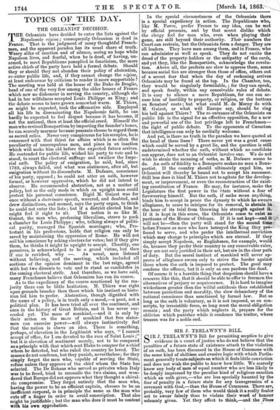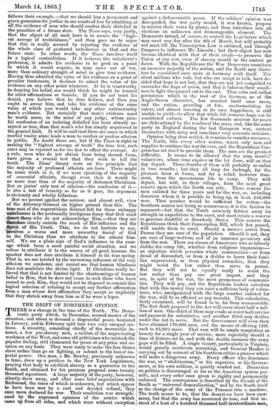SIR J. TRELAWNY'S BILL.
SIR J. TRELA.WNY'S Bill for permitting sceptics to give evidence in a court of justice who do not believe that the penalties of a future state of existence attach to the violation of an oath, has been discussed in the House of Commons with the same kind of shiftless and evasive logic with which Parlia- ment generally treats subjects on which it feels little conviction and does not wish the public to know how little. We scarcely know any body of men of equal number who are less likely to be deeply impressed by the peculiar kind of religious sanction which an oath gives,—who are less specially haunted by the fear of penalty in a future state for any transgression of a covenant with God,—than the House of Commons. There are, probably, very few of them who would think it a really fouler act to swear falsely than to violate their word of honour solemnly given. Yet they affect to think,—and the 7Inzes follows their example,—that we should lose a permanent and grave guarantee for justice in our courts of law by admitting at all the evidence of men who should confess their disbelief in the penalties of a future state. The Times says, very justly, that the object of all such laws is to secure the "high- est average of truthfulness," and then goes on to argue that this is really secured by rejecting the evidence of the whole class of professed unbelievers in God and the future state. In other words, the Times involves itself in a logical contradiction. If it believes the unbeliever's profession, it admits his evidence to be good on a point in which it would require, in nine cases out of ten, more than ordinary strength of mind to give true evidence. Having thus admitted the value of his evidence on a point of peculiar tenderness, it declines to admit the value of his evidence on any other point whatever. If be is trustworthy in denying his belief, one would think he might be trusted for other affirmations or denials. If you do not trust his denial, you believe that he does believe, and then you ought to swear him, and take his evidence at the same value at which you would take any other untrusworthy man's evidence. But certainly that man's evidence must be worth more, in the mind of any judge, whose pain- ful confession of an isolating disbelief has been already ac- cepted as true, than that man's who has simply acquiesced in the general faith. It will be said that there are cases in which morbid vanity alone leads a man to confess or profess atheism in public. No doubt there are, but if the Times is right in making the "highest average of truth" the true test, such cases may be rejected as far too few to affect the average. As a rule, men who do not shrink from being shrunk from, have given a crucial test that they wish to tell the truth. The Times' theory rests on the principle that the majority of professed atheists are liars. There might be some truth in it, if we were speaking of the majority of concealed atheists, though even then it would be no more true than of the majority of dishonest Christians. But as juries' only test of atheism—the confession of it— is also a test of veracity so far as it goes, the argument is obviously and wholly fallacious.
But we protest against the narrow, and almost evil, view of the Attorney-General on higher ground than this. The tine root of the superstitious distrust felt for these unhappy unbelievers is the profoundly irreligious fancy that God must desert those who do not acknowledge Him,—that they are filhoefore clearly outside the reach of His influence and the *int of His Truth. This, we do not hesitate to say, involves a worse and more unworthy denial of God in the Christian than we attribute to the atheist him- self. We see a plain sign of God's influence in the cour- age which faces a most painful social situation, and we refuse to attribute it to the source of all good, because the speaker does not dare attribute it himself to its true spring. That is, we are tainted by the narrowing influence of the very atheism we condemn, and cannot see that human blindness does not annhilatc the divine light. If Christians really be- lieved that God is not limited by the shortcomings of human belief in Him, that he does not cease to seek those who have ceased to seek Him, they would not be disposed to commit this logical solecism of refusing to accept any further affirmation from a man whose first affirmation they accept so implicitly that they shrink away from him as if he were a leper.































 Previous page
Previous page